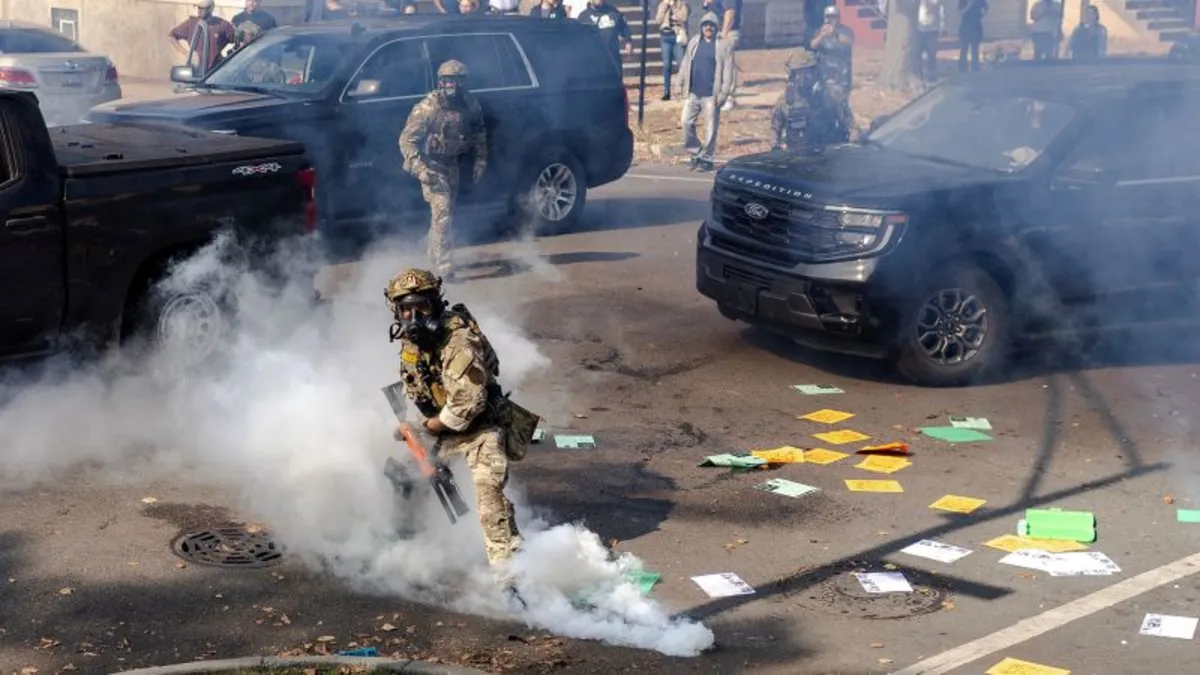
A federal judge in Illinois has expressed her serious concerns regarding whether federal law enforcement agents are adhering to her directives aimed at preventing violent confrontations with protesters and journalists in Chicago. US District Court Judge Sara Ellis voiced her frustrations during a hastily arranged hearing on Thursday, stating, “I’m a little startled frankly, that since Thursday when I entered the (temporary restraining order) last week, I’m getting images and seeing images on the news, in the paper, reading reports, where at least from what I’m seeing, I’m having serious concerns that my order’s being followed.” Judge Ellis emphasized her dissatisfaction, adding, “I’m really not happy.”
In response to these concerns, Judge Ellis announced that all federal agents equipped with body cameras will now be required to activate them during encounters with immigration protesters. “That’s the nice thing about body cameras is that they pick up events before the triggering event happens,” she remarked. Initially, the judge mandated that all agents wear body cameras, but she showed some flexibility after Sean Skedzielewski, an attorney for the Trump administration, argued that equipping all agents with bodycams immediately would be logistically impossible.
The Department of Justice has opposed the body camera mandate, arguing that recording and reviewing the footage would consume a significant amount of resources. “It would require a tremendous amount of resources,” Skedzielewski said, highlighting the challenges of consistently managing body camera footage.
Judge Ellis, who was appointed by former President Obama, issued the temporary restraining order last week after a coalition of local journalists and protesters filed a lawsuit against the Trump administration. The plaintiffs argued that federal law enforcement agents had been targeting individuals involved in peaceful protests, including multiple reporters who reported being fired upon with pepper balls despite clearly identifying themselves as members of the press.
Since the order was enacted, the plaintiffs have reported at least two incidents where they believe federal agents did not comply with the judge’s ruling, including a confrontation on Chicago’s southeast side following a traffic accident involving US Border Patrol.
Judge Ellis underscored the importance of proper law enforcement protocols, stating, “There’s a reason the Chicago Police Department has policies about car chases and where they occur, and where they need to stop.” She also mandated that the field director of the Operation Midway Blitz appear in court on Monday at 10:30 a.m. local time to address reports of tear gas being deployed without prior warning.
The original restraining order prohibits federal agents from targeting journalists who are not interfering with law enforcement activities. Additionally, it restricts the use of tear gas and less-lethal munitions against anyone deemed not to pose an “immediate threat to safety.”
Judge Ellis expressed her concern regarding the potential violations of constitutional rights, stating, “The issue is that DHS is using force in a manner that violates the constitutional rights of peaceful protesters, journalists, and essentially, clergy members.” She firmly stated, “You can’t shoot ‘em in the head (with pepper balls). You can’t deploy tear gas. You can’t use flash-bang grenades. You can’t drive a car through a crowd.” This follows public outrage after video footage emerged showing a pastor being repeatedly shot with pepper balls during a demonstration outside of an ICE facility near Chicago.
In response to the ongoing tensions, Illinois Governor JB Pritzker, who is not a party to the lawsuit, expressed skepticism regarding the enforcement of Judge Ellis’s order. “ICE is causing this mayhem,” Pritzker stated, asserting that federal agents have been responsible for deploying tear gas amidst peaceful protests.
In a separate legal matter, a federal judge recently blocked President Donald Trump from deploying National Guard troops in Chicago, a decision that the administration is currently appealing. This situation continues to develop, and further updates will be provided as the story unfolds.
Correction: An earlier version of this story inaccurately described Border Patrol Chief Gregory Bovino’s role in Chicago.